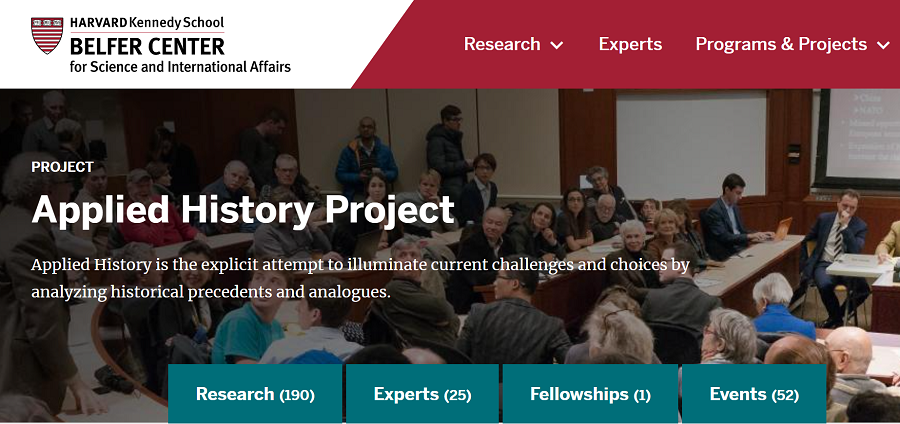This blog post was written by Jacob Forward, History & Policy Project Support Officer
In May this year, History & Policy celebrated the 20th anniversary of its foundation. It was a fittingly festive occasion, reuniting the many people who have played a part in H&P’s story over the past two decades. During two panel discussions and a drinks reception, the attendees reminisced about the network’s development and debated the case for applied history. As a young historian with an active interest in the future of the field, I was particularly intrigued by the conversations about applied history (the application of historical lessons and ideas to the present). Why did applied history, once as good as an axiom of the subject, fall out of favour? To what extent has this approach returned in recent years? And what might the future hold?

When the Ancient Greek historian Thucydides wrote his history of the Peloponnesian War, he was confident of the practical utility of his work. He reasoned that ‘events of future history will be of the same nature—or nearly so—as the history of the past, so long as men are men.’ This keen interest in the practical utility of lessons learnt from history is one of the longest-running currents in historical writing, as seen, famously, in Machiavelli’s Il Principe and John Robert Seeley’s conception of history as the “school of statesmanship”. Only comparatively recently have historians from across the ideological spectrum, from the post-modernists on the one hand to the likes of Geoffrey Elton on the other, dismissed attempts at seeking the relevance of history and hence distanced themselves from the Thucydidean view.
One can understand the trepidation about applied history among this generation of historians. Many horrors of the 20th century were committed by those who claimed to be fulfilling a historical mandate, or who weaponised historical analogies to serve nefarious political ends, from Mussolini to Mao. Nor is this a problem confined to the past. In July 2021, as troops were amassing on the border, the Kremlin released a paper supposedly penned by Putin ‘On the Historical Unity of Russians and Ukrainians’, which re-writes history to fit their foreign policy. Despite the obvious risks of invoking the past in the policies of the present, growing numbers of historians and policymakers are recognising the positive potential of applied history done well.
Following seminal publications on the validity of the approach by Ernest R. May and Richard Neustadt in the ‘70s and ‘80s, we have seen over the last decade or so, an emerging interest in applied history among scholars and practitioners alike. Starting with History & Policy in 2002 and joined by the small Applied History Network based in London in 2015, Professors Graham Allison and Niall Ferguson’s 2016 foundation of the Harvard Kennedy School’s Applied History Project represents a major step in the resurgence of interest in applied history, with its own courses, a fellowship program and public seminars. One of the latest developments, in November 2018, was the launch of the Journal of Applied History by Brill publishers. The recent move of History & Policy back to its original home in the Institute of Historical Research was itself a recognition by the University of London’s School of Advanced Study of the significance of applied history for the public profile of the broader Humanities community.

This resurgence of interest in applied history suggests that increasing numbers are recognising the benefits of the approach, and the future looks bright. In his excellent article on the subject for History & Policy, John Tosh argues that the approach of H&P’s contributors is best described as a practical historicism, that employs both processual and analogical reasoning to shed light on the policy problems of the day. Where historical analogies are used, they respect ‘the gulf between past and present’ and open up debate, creating new avenues for exploration rather than narrowly prescribing solutions. With its twenty-year pedigree and ever-growing network of historians and policy makers, H&P is well placed to play a leading role in the return of applied history, an approach which when undertaken with due care and self-consciousness can benefit us all.
Shortly after H&P’s anniversary event in May, I was struck by the following metaphor: government without history is like a mind without a memory; endlessly reactive, caught up in the exigencies of the present, deeply insecure in its identity and exhaustively reinventing the wheel. Thus, if history could be well integrated into government, as the memory is to the mind, the chaos of the unfolding present would settle into perspective, a stronger identity would lead to a clear sense of purpose, and the wheel could be reengineered, not reinvented.

Jacob Forward studied history at Keble College, Oxford, and worked as History & Policy’s project support officer in the year following his graduation. Currently, Jacob is undertaking an MPhil in American History at King’s College, Cambridge.

